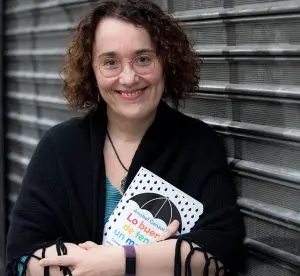HEALTH | 24.03.2020
Anabel González, psychiatrist and author of Lo bueno de tener un mal día (The Good Thing About Having a Bad Day)
“We need to prepare ourselves emotionally for the slump that will come later”
A good life is not one where nothing happens, but rather where we deal with things that happen as best as we can. This is part of the philosophy of this doctor of Medicine, who has just published Lo bueno de tener un mal día (Planeta), her second book on emotional health and well-being. Her main mission right now is to teach us how to train and handle our emotions during difficult times, in order to thus prevent or reduce the post-traumatic stress that many people will experience when this situation ends.
Is it possible to manage to see the positive side in situations as complicated as those we are currently experiencing?
There is no doubt that a lot of good things are being generated, and that we are learning much more than during any other stage in our lives. Handling bad times well is what gives life meaning and what most helps you to be well. If we handle normal days as best we can, when a bad situation like this happens, we will be more prepared and things will be a little easier I think that if we did not previously handle difficulties well, now is the time to start fast-track training, not just to develop good habits, such as physical exercise, but also to get an emotional work out. We need to learn not to beat ourselves up too much, not to abandon ourselves, and also to take care of others. All this is key for now, but also for later, when everything is over and we realize how tired we are and the tension that has built up. That slump will be more bearable if we have not wasted our energy and have done constructive things.
What behaviors must we train, exactly?
Just like on airplanes, we need to put on our own oxygen mask before putting one on others. This means that it is important that we allow ourselves to go to our room for a while, if we need, to let off steam, talk to someone or cry. It is also very important to take into account something that is being discussed a lot these days and that is trying to keep to a routine, an order of activities, and trying to move around and even find time to laugh, dance, and sing a song that boosts us up. I think this is a unique moment to dedicate time reflecting on ourselves, observing our bodies, listening to our breathing, and examining our conscience regarding how we feel. If we act like this, we will realize that it is possible that the mechanisms that previously worked for us and which we used to use to get by, are no longer useful to us now. We are at a time when emotions are going to skyrocket and we need all of our regulatory systems to work as best they can. We must not forget that we facing a potentially highly traumatic situation. The good thing is that, if we train all of this, and manage to find resources that work for us, we will become more resistant.
What messages can we send to our children?
The best gift we can give them now is to accompany them in the process, so that they can tell us and express everything they are feeling, and we must comfort them with words and looks, not just with physical contact. We also need to learn to calm ourselves, in order to transmit calmness to them. We are experiencing a situation that has happened to them unexpectedly and has completely disrupted their lives, as it has ours. It is important that we ask them, that we encourage a conversation and, if we do not have much experience in expressing emotions, now may be a good time to start. If they throw tantrums, which is very normal in this type of situation, we should try to understand what lies behind it. The best thing to do in these cases is to express contentment, because it is, without a doubt, what will help them to channel their anger, discomfort and helplessness, and it will be a very important lesson for them. Adolescents may also explode and, if they do it with us, let’s talk to them first about how difficult this situation is and that we understand that they are finding it hard. Let’s look behind the behavior; let’s be a mirror for reflection. I know that this is difficult and that we will also be nervous, but if we are there when they have a bad time, they will learn to tolerate the discomfort, the frustration, and to handle difficulties in a better way. This may be a good thing to come out of this bad time.
What happens to people who live alone?
Unfortunately, for some, this situation is the closest thing to being alone with their worst enemy; they either abandon themselves, or don’t get out of bed, don’t shower, or don’t eat. A long time spent in these conditions may be more difficult to overcome later. Instead, these forced stop circumstances, during which we are spending more time by ourselves, can be an opportunity for these people to start reconciling with themselves, to be aware that they are hurting themselves, and, from there, they can start to make changes in their inner circle.
You emphasize the importance of not living on the sidelines and ignoring what is happening.
That’s right. I think that there are some groups this epidemic will undoubtedly take its toll on. I’m referring to people who are acting as if nothing is happening, people who are more hyperactive than normal, and people who forget to take care of themselves, because they are dedicated to caring for others. It is essential that we all take care of ourselves at this time, and, very specifically, all medical staff, because they are the ones on the front lines. For them, it is like a war against an invisible enemy, and it is very difficult to win. We must not forget them, because it will surely take them many months to recover. They are the ones who are most exposed, and they will face very hard situations. They will undoubtedly need special attention.
Your book reflects the idea that we live at a very fast pace.
It certainly does, and I think this is another realization that we will gain from this circumstance. The epidemic has forced us to stop. These days, we spend more time together and without all those stimuli that usually distract us regularly. It is a good time to learn to get bored, frustrated, and despair a little, and you learn a lot from all of this. We need to allow ourselves to sweep times of sadness from under the carpet, which, in many cases, may have been within us for a long time. We live in a society where we are living at such a fast pace that we hardly spend any time seeing how we are doing and listening to ourselves, and others. Added to all of this is the fact that we are obsessed with achieving ultimate happiness, permanent happiness, and that addiction makes us permanently dissatisfied.
You believe that, in general, we place many obstacles in the way of being happy. What obstacles do you mean?
Lo bueno de tener un mal día is a book about emotions, about the importance of listening to them and understanding them, not keeping them in a drawer. Few sayings have been more damaging than “you have to put on a brave face during bad times.” I believe that, during bad times, you need to show tears and sadness and, during good times, smiles and happiness.
EMOTIONAL KEYS FOR TIMES OF CRISIS
- Bad days happen, so it is a good to learn how to react to them productively. This is the best training we can do throughout life. This is how we will deal with things in an increasingly better way.
- Expressing an emotion is key, because if you don’t, it remains stagnant, and may even overflow, which can make us suddenly feel very sad, without knowing where it is coming from.
- Sadness must be taken care of, because it informs us that we have lost something that means a lot to us. If we also share it, even better. Nothing dilutes sadness better than a hug from someone who understands how we are feeling.
- Getting angry is essential, but you have to learn to do it well, that is, do it at the right time and in the right proportion. This means realizing that we don’t like something and saying it, moderately and smartly.
- We need to practice flexibility and gain a certain fondness for uncertainty and confusion in order to reduce fear.
- We live in a society where we are living at such a fast pace that we hardly spend any time seeing how we are doing and listening to ourselves.
- Difficult times are not overcome alone. It is important that we learn to lean on the people around us.
- We shouldn’t tell children not to cry. They need to learn to handle sadness. This is like putting a plaster on a problem, without solving it. In addition, we are giving people the impression that what they feel is not important.
- There are such things as virtual hugs, which are expressed with loving looks, with tone of voice and, of course, with words.
- Some people have a bad day and they don’t turn it into the end of the world, bit rather try to solve it and make the best of it. This does not equate to not feeling something; on the contrary, it means that we can handle discomfort.
Profile 
Anabel Gonzalez (A Coruña, aged 53) is a psychiatrist and psychotherapist and doctor of Medicine. She currently works at A Coruña University Hospital (CHUAC). For years, she has been training other specialists and is an accredited EMDR therapy trainer, which involves working on the memories of people who have been through traumatic experiences so that said experiences do not affect them and do not influence their lives. She is also a teaching collaborator at CHUAC and participates, as a guest professor, in the EMDR Psychotherapy Master’s at the National University of Distance Education (UNED).

